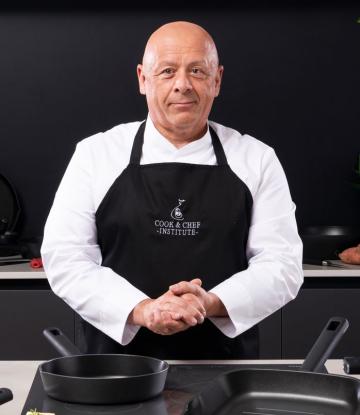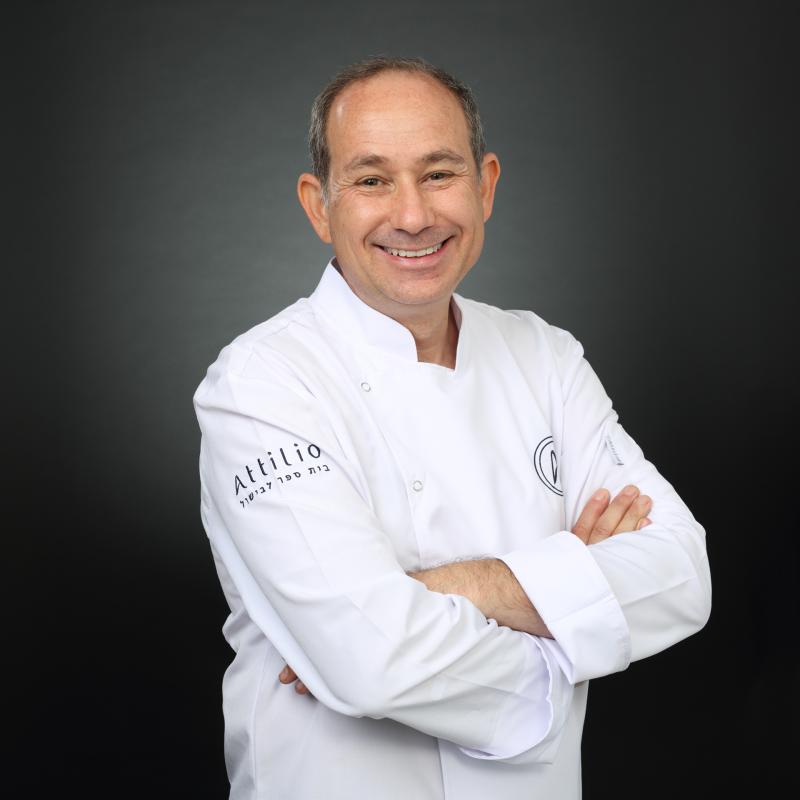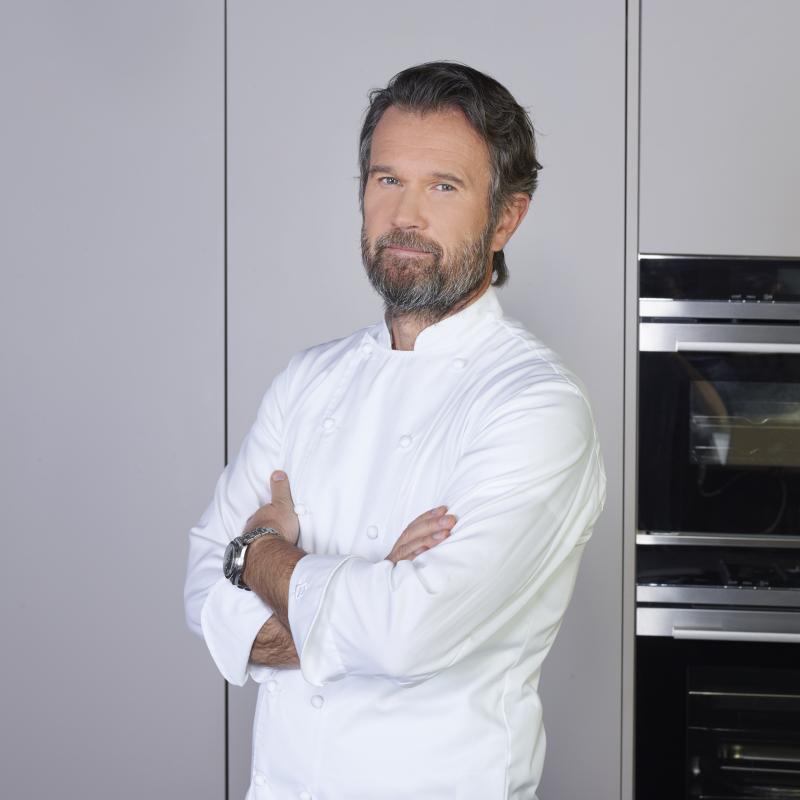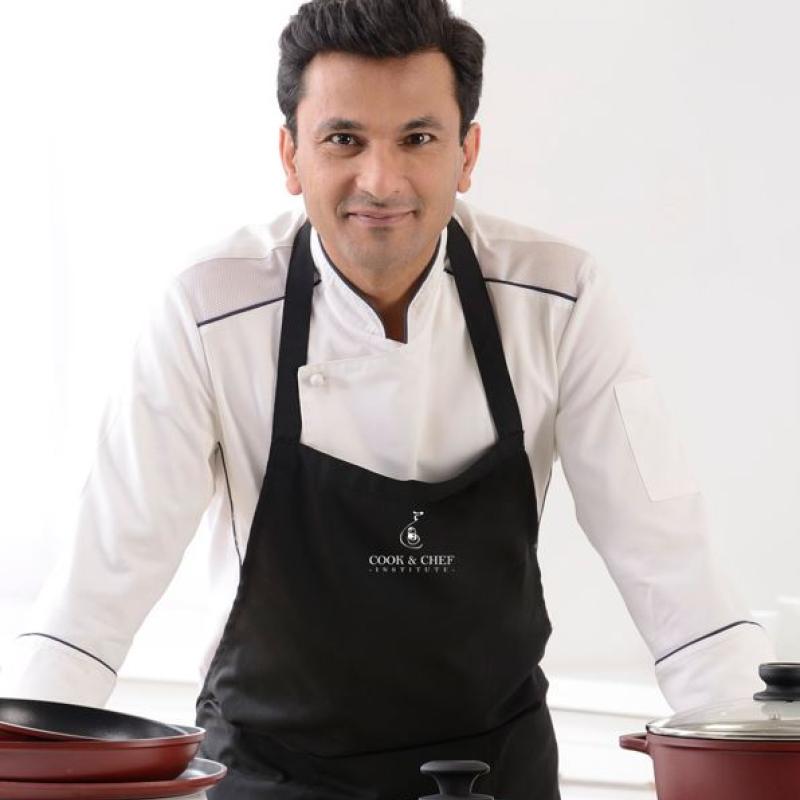Cook & Chef Interviews
One on one with Thierry Marx
Chef Thierry Marx's career is an adventure. In 1978, he graduated as a pastry chef, chocolatier and ice cream maker, but just two years later, he enlisted in the army as a paratrooper in the marines and joined the United Nations Peace Forces, popularly known as the Blue Helmets, participating alongside them in the Lebanese Civil War.
When the conflict ended, he returned to France and held various jobs before returning to the kitchen as an assistant chef at three of the country's most prestigious restaurants: Ledoyen, Taillevent and Robuchon. He then travelled widely, living in Australia, Japan, Singapore and Hong Kong. These countries helped him build the culinary identity which now makes him one of the most important chefs in France.
Thierry Marx has earned Michelin stars on four occasions, in recognition of his work in three of his restaurants.

Currently, in Paris, he runs the restaurants Le Sur Mesure, which fuses tradition and innovation in French gastronomy, and Le Camelia, both located in the Mandarin Oriental hotel; as well as Madame Brasserie, a contemporary and elegant café-restaurant on the first floor of the Eiffel Tower; and ONOR, his latest restaurant and most personal project, which brings together haute cuisine, decoration and sustainable materials and social impact.
ONOR is located on the prestigious Rue du Faubourg Saint Honoré, at 258, next to the Pleyel concert hall. It represents a new company model in which 20% of the staff hired come from different social schools, and the well-being of the collaborators is a priority.
In 2013, he launched the French Centre for Culinary Innovation (CFIC) at the University of Orsay, a research laboratory that he shares with Professor Raphael Haumont, physicist, chemist, researcher and gastronomist and which aims to respond to the question "How can we improve the content of our dishes?".
He also runs TM4, an agency dedicated to the entire process of establishing a new restaurant: from conceptualization, through interior design, architecture and promotion, to management and training advice.
His social projects include ‘Cuisine mode d'emploi(s)’, a centre providing free training in catering, cooking and baking aimed at unemployed people, migrants, refugees or those who have just been released from prison.
- You are one of the most important chefs of the most influential cuisine in the world, that of France. How is your life's trajectory reflected in the successful entrepreneur you are today?
I always try to innovate and move beyond my circles. If we don't innovate, we end up standing still like everyone else. You have to have the audacity to innovate in order to excel and move forward.
- You are a lover of tradition in French cuisine and defend innovation as a way to continue elevating it. In 2013, you launched the French Center for Culinary Innovation (CFIC). What results have you achieved thanks to this research initiative?
First of all, I want to say that there is no conflict between tradition and innovation. You always have to keep that in mind. What is now tradition was once a novelty! We have been researching ways of reducing sucrose in cooking and baking, and have developed several chocolate recipes without added sucrose. We have also studied fruit pectins as natural gelling agents and worked on vacuum or pressurised textures.
- And have you found an answer to the question, about how we can improve the content of our dishes, which you posed more than 10 years ago?
There is no single answer, but several. It is necessary to reduce the carbon footprint of the dish in general: prioritize local trade, choose products from regenerative agriculture, decrease water use and energy consumption in the way we cook... That is why we must also continue to innovate, so that the kitchen does not become predictable but rather can continue to generate emotion.
- What gastronomic surprises do you think the future holds if we apply more science to cooking?
The surprise will come from the quality of the products and their environmental impact. In the very near future, the most expensive ingredient in the kitchen will be water... We need to find answers about its rarefaction (the process by which a body or substance becomes less dense) to mitigate its scarcity and make consumption more sustainable.
- The word sustainability is on everyone's lips today, and it finally seems to be a real concern. How can we contribute to taking care of the planet through gastronomy?
As I said, saving water and energy is the most important thing. Science and the observation of nature teach us biomimicry (a discipline that promotes imitating nature to live better). From the natural processes we learn, innovations will emerge. We (the chefs) have to adopt those new behaviors and lead by example.
- Bread is your star food. After a few years in which its quality fell, more and more people are working to take care of their production process and use quality cereals. Do you think it is important to educate people on the importance of eating good bread?
Bread is a simple food; it is only water, salt and flour in conjunction with the experience and talent of the baker, yet, even so, bread plays a very important role in our gastronomy.
In general, people should be educated if they are to become the 'eaters' of tomorrow and not merely consumers - and even over-consumers - of industrial food. Gastronomy courses should be introduced at primary school level so that children learn what a good product is, develop their tastes and become wise eaters.
- In addition to loving bread... Tell us which dish is sublime for you.
I have no favorite dish. I always think maybe the next dish I try may be the most sublime of all. I travel the world to discover and sample new signature cuisines. That's what I'm passionate about. And it's always hard to say there's only one sublime dish. A dish should make the ephemeral memorable.
- The social aspect is also very present in your life, via the training of migrants and unemployed people in your kitchens. How do you summarise your involvement in these types of projects?
It's simple: make hospitality more attractive to discover new talent in a profession that suffers from a shortage of new human resources. I try to propose quick and effective training for people who are on the margins of the labor market, and give them a professional future in gastronomy. 20% of my employees come from those backgrounds.
- How do you feel about the title of “activist” which you referred to by France?
I define myself more as a militant than an activist. To be militant is to commit oneself to social and planetary protection. I am militant when it comes to social and environmental impacts.
- Can you take us on a gastronomic trip around the world without leaving Paris?
I recommend the French restaurant Le Cadoret, a very good brasserie near Menilmontant, the neighborhood where I lived when I was little. Also the Japanese restaurant Sushi B, one of the best places to try sushi in Paris. Finally, the restaurant Le Cherche Midi, an Italian institution located on the left bank of the city.
- Tell us something you still have left to learn.
I always seek to develop my curiosity to remain a free man. I also want to perfect my skill through learning (cutting vegetables, fish…), because good cuisine is made with foods that have been well cut.



